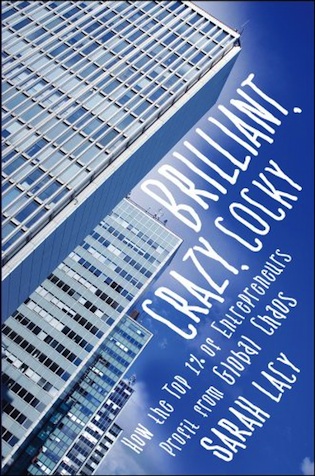 TechCrunch Editor Sarah Lacy’s new book Brilliant Crazy, Cocky: How The Top 1% of Entrepreneurs Profit From Global Chaos has been out for a couple of weeks now. I had an early copy and read it, but held off on a review until an independent ones came in.
TechCrunch Editor Sarah Lacy’s new book Brilliant Crazy, Cocky: How The Top 1% of Entrepreneurs Profit From Global Chaos has been out for a couple of weeks now. I had an early copy and read it, but held off on a review until an independent ones came in.
In the meantime, I read it again. Because I realized that Sarah kind of has it all wrong. Or at least didn’t draw the final conclusion that I did based on all her work.
Not to knock the book. It’s an excellent piece of journalism, taken from nearly a year of traveling around the world to meet with entrepreneurs in Asia, Africa, Israel and South America. To try to understand how entrepreneurs are reshaping their worlds in those places, and how America is sometimes being left behind.
There are some truly amazing stories. A Brazilian named Marco Gomes who grew up in the slums of Rio before eventually starting his own company, getting featured on TechCrunch, raising venture capital and running forward from there. A slew of fearless Chinese entrepreneurs who are creating some of the most trafficked websites on the Internet. And, even, an entrepreneur in Rwanda who made his first entrepreneurial strides by producing…toilet paper.
Lacy is right that entrepreneurship is spreading around the world in ways that it never did before. And she’s right that Americans need to, and in many cases are, taking note and making investments in these non-U.S. entrepreneurs.
And she’s right that we are not holding on to enough immigrants, which are a crucial part of many of Silicon Valley’s most successful startups. “One quarter of successful Silicon Valley companies were started by immigrants,” Lacy says, mentioning Intel, PayPal, Google and Yahoo.
But Sarah seems to be arguing that there’s something to fear in the spread of entrepreneurism, that the more of it that happens outside of Silicon Valley, the more we should be worried.
I don’t think that’s the case. I agree, strongly, that we should do more to spur entrepreneurism here. Mostly by leaving Silicon Valley alone.
But here’s what I think people, particularly governments, should really be taking from the book: Shame on you. Shame on you that in Rwanda Jean de Dieu Kagabo chose to make toilet paper instead of starting the next multi-billion dollar tech company. Or that a brilliant kid in Brazil needs to worry about getting shot by drug dealers. Or that Indian entrepreneurs need to worry about electricity and water. Or that Chinese entrepreneurs live in nearly perfect economic freedom but ignore the elephant in the room – an oppressive government that occasionally shuts down businesses on a political whim.
Yes, people like Jean de Dieu Kagabo and Marco Gomes and all the rest will always find a way to make their lives better through entrepreneurship. War, poverty, hunger and oppression won’t keep them down.
But it sure does stifle them. Far better for the world to make life more bearable for people, and see where entrepreneurs lead them. Then, maybe, Silicon Valley can start to get its butt kicked. Which maybe will get our politicians to ease up on milking that cow. Which will spur more international competition. And human progress will move forward at an accelerated pace.
Sarah’s book opened my eyes. But not to the risk that Silicon Valley can be toppled. Rather, she opened my eyes to the untenable constraints that people around the world have to work with. And damnit, that needs to change.
Silicon Valley isn’t a place. It’s an idea. And whether you’re making toilet paper in Rwanda or building gaming companies in Asia, you’re part of it.
So buy this book. And read it. You may not agree with me, but you’ll better understand the world, and our community. And maybe help future entrepreneurs channel their energy into even more amazing things.